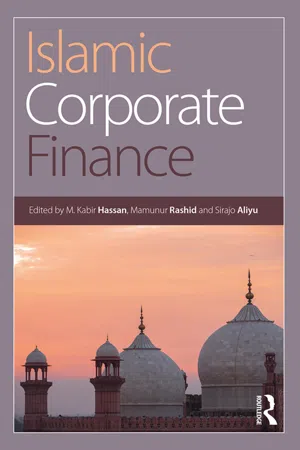
Islamic Corporate Finance
- 210 pages
- English
- ePUB (mobile friendly)
- Available on iOS & Android
Islamic Corporate Finance
About this book
Most existing texts covering topics in Islamic finance discuss the potential of Islamic banking; very few talk about other forms of financing and the investment activities of Islamic firms from the standpoint of owners and managers. This book fills this gap by looking at the traditional as well as non-traditional financing and investment activities of shariah-compliant companies.
The chapters in this edited text offer a full range of topics on corporate finance for Islamic firms, including global comparisons of shariah screening, dividend policy and capital structure of Islamic firms, details of global Islamic equity markets, trends and performance of sukuk markets, and a brief account of derivative securities that can be used in Islamic finance. This is a useful reference for anyone who wishes to learn more about the performance of shariah-compliant companies vis-à-vis conventional firms. The book includes both technical and non-technical information that would be suitable for classroom teaching as well as a reference for postgraduate research students.
Tools to learn more effectively

Saving Books

Keyword Search

Annotating Text

Listen to it instead
Information
1
Screening and performance of shariah-compliant companies
Introduction to shariah screening
The start of the Islamic finance standard
| Business activities | Index | |||||
| DJIM | S&P | SAC | FTSE | MSCI | AAOIFI | |
| Alcohol | P | P | P | P | P | P |
| Advertisement and media | P | P | A | A | A | – |
| Cloning | P | – | – | – | – | – |
| Conventional financial services | P | P | P | P | P | P |
| Gambling and gaming | P | P | P | P | P | P |
| Pork-related products | P | P | P | P | P | P |
| Adult entertainment (pornography) | P | P | P | P | P | P |
| Tobacco | P | P | P | P | P | P |
| Public image | – | – | I | – | – | – |
| Maslaha (public interest) | – | – | I | – | – | – |
| Weapons and arms | P | P | P | P | A | P |
| Hotels | P | A | A | P | P | – |
| Trading of gold and silver as cash on deferred basis | – | P | – | – | – | – |
| Stem cell research | – | – | – | – | – | P |
Table of contents
- Cover
- Epigraph
- Half Title
- Title Page
- Copyright Page
- Contents
- Figures
- Tables
- Contributors
- 1 Screening and performance of shariah-compliant companies
- 2 Is there a cost for adopting faith-based investment styles?
- 3 Islamic corporate finance: Capital structure
- 4 Islamic venture capital financing
- 5 IPO underpricing, regulation, sentiment and shariah screening in Bangladesh
- 6 Sukuk: Introduction and global performance
- 7 Sukuk: Meaning, valuation, benefits and challenges
- 8 Dividend policy: The case of shariah-compliant firms
- 9 Prospects for Islamic derivatives in Bangladesh
- 10 Impact of derivative usage on the value of shariah-compliant firms in Malaysia
- Index
Frequently asked questions
- Essential is ideal for learners and professionals who enjoy exploring a wide range of subjects. Access the Essential Library with 800,000+ trusted titles and best-sellers across business, personal growth, and the humanities. Includes unlimited reading time and Standard Read Aloud voice.
- Complete: Perfect for advanced learners and researchers needing full, unrestricted access. Unlock 1.4M+ books across hundreds of subjects, including academic and specialized titles. The Complete Plan also includes advanced features like Premium Read Aloud and Research Assistant.
Please note we cannot support devices running on iOS 13 and Android 7 or earlier. Learn more about using the app